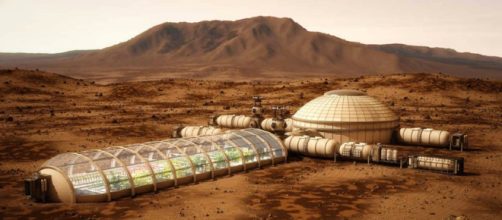f A group of researchers and professionals simulated the conditions of life on Mars in the desert of Oman in preparation for a future landing on the Red Planet. Sponsored by the Sultanate of Oman and supported by companies and universities, the AMADEE-18 program launched on Thursday was organized by the Austrian Space Forum. Volunteers dressed in space suits were entered this week in the desert of Oman to conduct investigations and simulations of living conditions on the planet Mars.This mission takes place as the multimillionaire American businessman Elon Musk has just launched into space the most powerful rocket in the world, an achievement that constitutes a stage towards the transport of humans to Mars.
Adaptations of the desert
In a field surrounded by barbed wire and under the protection of the local armed forces, they carry out experiments such as growing fresh vegetables in plastic greenhouses or rolling autonomous vehicles through the winding terrain. The field of prefabricated buildings, most of which were installed by an Omanian commission before the mission, is a comfort outpost on Earth: hot showers, air conditioners, a gigantic inflatable igloo that pours air and a labyrinth of rooms served by a generator 24 hour a day. The participants also drive vehicles packed with batteries under a blazing sun to specify other experiences carried out by university researchers.
Special place
The president of the Forum, Alexander Soucek, says that his colleagues are achieving a special place with the simulations of Mars and that they are able to carry out their investigations with more flexibility and agility."Most of the money we use is not from taxpayers.
We have sponsors in private industry. We collect money, we create associations and we invite people to join forces”, he explains. The Forum does not have an official position on exploration and mining in space, but Soucek believes that future missions will take advantage of what they find. "Once we arrive and live on Mars, we will have to use the resources we find there since we will not be able to take everything from Earth. This is what is called the use of resources 'in situ'. Therefore we will have to use the things that we find: first to maintain life there, then to support the missions and then, in the longer term, perhaps for other things "This is how the volunteer astronauts plan to explore the red planet, they go with a single purpose and it is the role of the scientist.
First manned trip
It's been a long time since the first manned trip to Mars stopped being theory to instead become a long-term possibility that has been shortening its time. Although the release date still varies depending on whether NASA or some private initiative takes the reins, it seems that the next 20-30 years big changes will occur. The arrival of man to planets beyond Earth is approaching and that is why people are training for be sent to the red planet, with the purpose of living in worlds that are not our own for the first time.


